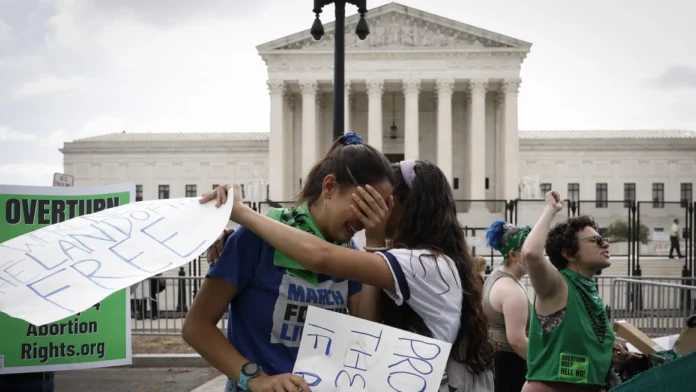The number of so-called medication abortions has gone up dramatically in the United States. The US Supreme Court is set to hear a legal battle over restrictions on the abortion pill mifepristone.
A popular abortion medication is at the center of the latest abortion lawsuit in America. On Wednesday, the US Supreme Court said it will review lower court restrictions on abortion pill mifepristone.
The pill was used in 53% of the 930,160 US abortions documented by the Guttmacher Institute in 2020.
The number of so-called medication abortions has increased considerably in the US, yet it is still lower than in several European countries.
Medication abortions accounted for 70% of French abortions in 2020.
The abortion pill differs from the “morning after” pill, which women take after sexual activity to avoid pregnancy.
The abortion pill induces abortion once a woman confirms her pregnancy.
The technique requires multiple pills. First, mifepristone (RU 486) blocks progesterone production, stopping a pregnancy.
Misoprostol, administered 48 hours later, induces cramping, bleeding, and uterine emptying.
Medical supervision is not needed to utilize abortion pills at home.
In 2000, the FDA approved mifepristone and misoprostol for usage up to seven weeks of pregnancy.
Later, it was permitted for usage up to 10 weeks of pregnancy, beyond which another abortion method such vacuum aspiration was required.
Medication abortions at Planned Parenthood cost $580 to $800.
Medical experts say the abortion pill is safe and effective during the stipulated time.
Studies show that the pill ends pregnancies in almost 95% of cases.
Serious problems such heavy bleeding, fever, infection, or allergic reaction seldom require medical attention.
Eutopic pregnancies occur when a fertilized egg grows outside the uterus in 2% of cases. The abortion pill fails them.
Since the Supreme Court’s June 2022 ruling abolishing the constitutional right to abortion, 20 US states have banned or severely restricted abortions, including pharmacological abortions.
Anti-abortion groups seek to outlaw mifepristone nationwide, even in abortion-friendly states.
Mifepristone use may be limited to the first seven weeks of pregnancy and mail distribution banned by the Supreme Court.
Conclusion
The Guttmacher Institute tallied 930,160 abortions in 2020, and the US Supreme Court will review lower court restrictions on mifepristone, which caused almost half of them. Medication abortions have increased in the US but are still less common than in France. The abortion pill differs from the “morning after” pill, which prevents pregnancy following sexual activity. First pill blocks progesterone synthesis, second pill causes cramping, bleeding, and uterine emptying. The FDA approved mifepristone and misoprostol for seven and 10 weeks of pregnancy, respectively. The average Planned Parenthood medication abortion costs $580, but it can cost $800. Medical professionals say the abortion pill is safe and effective, terminating over 95% of instances. The pill does not cover ectopic pregnancies. Around 20 US states have prohibited or severely restricted abortions since the Supreme Court’s June 2022 judgment. Mifepristone access is being restricted nationwide by anti-abortion groups, even in states where abortion is legal.



